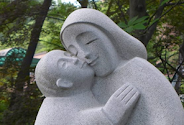I had a sore throat but I hesitated to go to the clinic immediately because I had an oncoming visa interview appointment. When I tested myself with a self-diagnostic kit, a negative response came out.
After the interview, I went to the clinic to check my
condition, and it turned out that I became infected with the coronavirus. All
of a sudden, together with five sisters, I had to leave the community and
quarantine at a vacation home in Sokcho for a week.
Thanks to this situation, I got enough rest while taking
medicine. Thanks to God, my ongoing symptoms were not that serious, so I began
to arrange various files of the photos and essays stored on my USB.
Several years ago, I tried to clear and arrange various files
as a part of the resolutions for the climate crisis but I couldn't make it.
While arranging them, I noticed also that I have kept so many
unnecessary photos. I am now trying to sort them out according to themes so
that I can refer to them when I need them for some purpose in the future.
One of my other plans is to upload my articles to my blog. So,
during these days, I continued to upload the articles that I have written since
1989 for The Korea Times' "Thoughts of the Times" column. All in all,
there are more than 250 pieces, and each of them reveals some stories of my
life.
I created a blog titled "A piece of sunshine" at
mtorchid88.blogspot.com. When you have time, feel free to visit this blog. The
goal or intention of my blog is to be the sunshine that is always with us like
a piece of sunshine after a rain shower, like a piece of sunshine after the
dark clouds, like the pouring sunshine giving dreams day by day.
Several years ago, as part of a talent donation, I wrote a
short meditation poem bilingually both in English and Korean once a week,
regarding the Sunday readings and Gospels in the corner titled
"Sketchbook" in the homepage "Pauline contents."
There are 12 corners under the title of
"Sketchbook," and one of them is titled "A piece of
sunshine" at contents.pauline.or.kr/bbs/board.php?bo_table=sunshine.
Looking back at my long journey of sharing the articles in
"Thoughts of the Times," I really appreciate the enduring efforts of
the editing board of The Korea Times. The editors in this daily newspaper are doing
a good job to improve the quality of the articles they receive from all over
the world. I am grateful for their constant accompaniment encouraging me to
keep writing.
For me, writing is a joy like the sprouts coming up from the
hard bark of the trees. I enjoy writing, and themes to write come to my mind
when necessary as I go on this journey.
I remember I used to carry a notebook to write things in when
I studied the English language and literature. Since then, writing has become an
inspiring habit.
"Do not let love and fidelity forsake you; bind them
around your neck; write them on the tablet of your heart. Then will you win
favor and esteem before God and human beings." (Proverbs 3:3-4).
https://www.koreatimes.co.kr/www/nation/2022/11/162_340656.html
The Korea Times/ Thoughts of the Times/
November 29 (online), 30 (offline), 2022
햇살 한 조각
목이 아팠지만 다가오는 비자 인터뷰 약속 때문에 곧바로 병원에 가는 것을 망설였다. 자가진단키트로 검사하자 음성 반응이 나왔다.
인터뷰를 마치고 병원에 가서 진료를 받았는데 코로나 바이러스에 감염된 것으로 나왔다. 불현듯 나는 다섯 명의 다른 수녀님들과 함께 공동체를 떠나 속초 휴가집에서 일주일 동안 격리되어 지내야 했다.
이러한 상황 덕분에 나는 약을 먹으며 충분히 쉬었다. 다행히 증상이 그리 심하지 않아 나는 USB에 저장해 놓은 사진과 에세이 파일을 정리하기 시작했다.
몇 년 전, 나는 기후 위기에 대한 다짐으로 여러 자료를 정리하려 했지만 그러지 못했다.
자료를 정리하면서 나는 불필요한 사진이 너무 많음을 또한 알았다. 지금 나는 앞으로 어떤 목적을 위해 필요로 할 때 참고할 수 있도록 주제별로 정리하려고 한다.
다른 계획 하나는 그동안 쓴 글을 블로그에 올리는 것이다. 요즈음 나는 1989년 이래 코리아타임스 “Thoughts of the Times” 칼럼에 썼던 글들을 블로그에 담고 있다. 모두 250여 개가 넘는 글을 올렸는데, 각 편에는 내 삶의 이야기가 실려 있다.
“mtorchid88.blogspot.com”이라는 웹 주소 아래 “A piece of sunshine”이라는 제목으로 블로그를 만들었다. 시간이 나면 이 블로그를 방문하시길 바란다. 블로그의 목표 또는 지향은 “소나기 뒤 드리운 햇살 한 조각처럼, 먹구름 뒤 스며든 햇살 한 조각처럼, 나날이 꿈을 주며 쏟아지는 햇살처럼 언제나 함께하는 햇살이 되고자” 하는 것이다.
몇 년 전부터 재능기부의 일환으로 “바오로딸콘텐츠” 홈페이지 안에 있는 “스케치북” 코너에 주일 독서와 복음 말씀에 대한 짧은 묵상시를 영어와 한국어로 써서 일주일에 하나씩 올렸다.
"스케치북"이라는 이름 아래 12개의 코너가 있는데, 그 가운데 하나가 “A piece of sunshine”이다. 이는 “contents.pauline.or.kr/bbs/board.php?bo_table=sunshine”에 들어 있다.
“Thoughts of the Times”에서 글을 나누기까지의 긴 여정을 돌아보며 The Korea Times 편집위원들의 끊임없는 노고에 진심으로 감사드린다. 일간지 코리아타임스의 편집진은 세계 곳곳에서 들어오는 글의 질을 높이려고 최선을 다한다. 계속해서 글을 쓰도록 격려하며 한결같이 동반해 주심에 감사드린다.
나에게 글쓰기란 딱딱한 나무껍질을 뚫고 돋아나는 새싹처럼 기쁜 일이다. 나는 글쓰기를 좋아한다. 이 여정을 한결같이 걸어가다 보니 필요할 때마다 글 쓸 주제가 떠오른다.
영어영문학을 공부할 무렵 나는 무언가를 쓰기 위해 늘 공책을 지니고 다니던 것이 떠오른다. 그 이래 글쓰기는 영감 어린 습관이 되었다.
“자애와 진실이 너를 떠나지 않도록 하여라. 그것들을 네 목에 묶고 네 마음속에 새겨 두어라. 그러면 네가 하느님과 사람 앞에서 호의와 호평을 받으리라.”(잠언 3,3-4)













